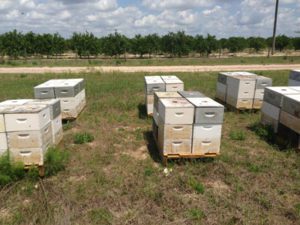While this article recently posted to Bee Informed discusses the struggles of commercial beekeepers to keep their bees healthy – or even just alive! – urban backyard beekeepers can learn a lesson from this. People are using pesticides all around us and it is up to each beekeeper to do the best that they can to protect their bees from these poisons. Know your neighbors and find out if they spray their yards with Round Up or the likes and if perhaps they might consider organic alternatives? Same with your neighborhood parks, businesses, etc. It’s worth a shot, maybe some folks just need a little nudge or information to stop using these toxic treatments.
Relationships between beekeepers and citrus grove owners in Florida have been tense the last several years but this year it came bubbling over. Both need to make a crop and they need each other to survive, but this relationship isn’t balanced. Beekeepers need the groves significantly more than the groves need the bees. In fact, the groves only need about 5% of the bees that are sent down every year and citrus growers’ attitude toward beekeepers is that if you don’t like what we’re doing, don’t come, we don’t want you here.
Despite this tension, the Florida Department of Agriculture (FDACS) is working to find possible solutions that will help diffuse the situation. One solution is an interactive web-based application that utilizes arcGIS to map blocks of citrus and provide contact information for the grower of that block. It also allows beekeepers to post yard locations with contact information in order for grove owners to contact beekeepers in the spray vicinity. Due to the sensitive nature of yard locations, they are listed as a dot in an area to protect beekeepers. The individual groves are color coded by age to make yard selection easy as younger groves may have been treated with neonicotinoids. In addition to highlighting citrus, the map also includes nectar sources all over Florida throughout the year. This application is not yet live but will be available January 2014 (just in time for next year’s bloom).
With the exception of testing for pesticide residue in pollen, wax, and dead bees which can be an expensive and lengthy process, the only indication of recent pesticide damage is unexplained dead bees in front of your hive entrances. If you keep bees in a cultivated agricultural area and fear pesticide damage, there are several steps you can take to prevent honey bee death.
1. Move your bees. If your colonies are stationary and you are not getting paid for pollination services, moving your bees to uncultivated areas is going to be the best way to keep them from getting sprayed.
2. If you are moving bees to orange groves, avoid young groves that are between 3-5 years old as these most likely have been treated with soil applied neonicotinoids. Older trees are also better for bee forage simply because they are bigger.
3. Try and contact the growers in the area. Ask to be notified if they are spraying or if they have a predetermined spray schedule.
